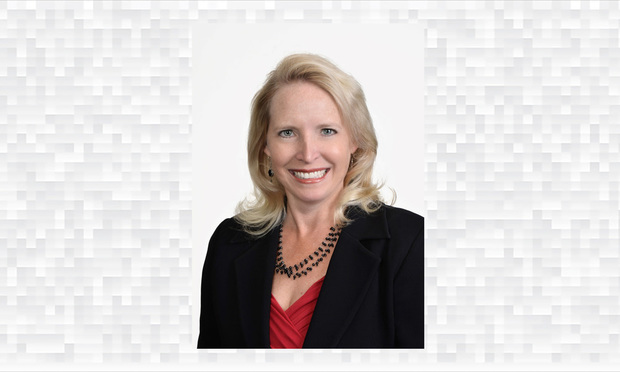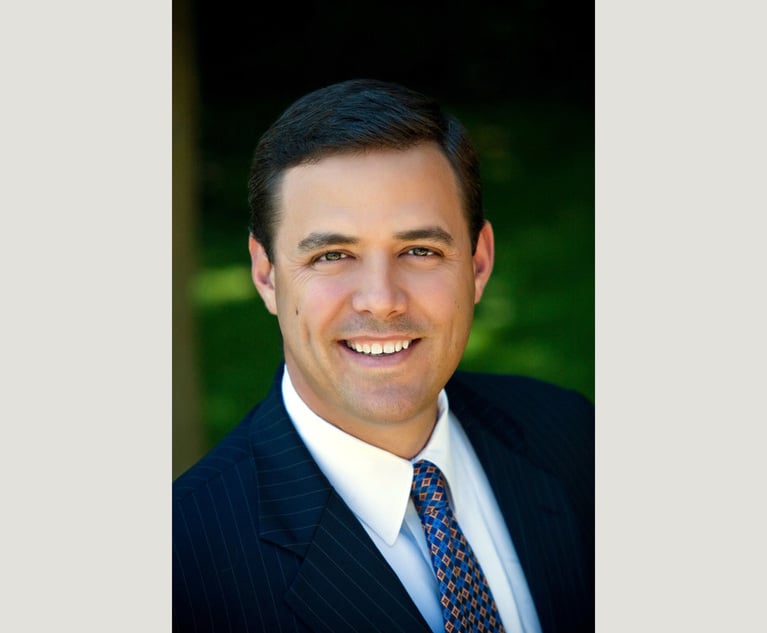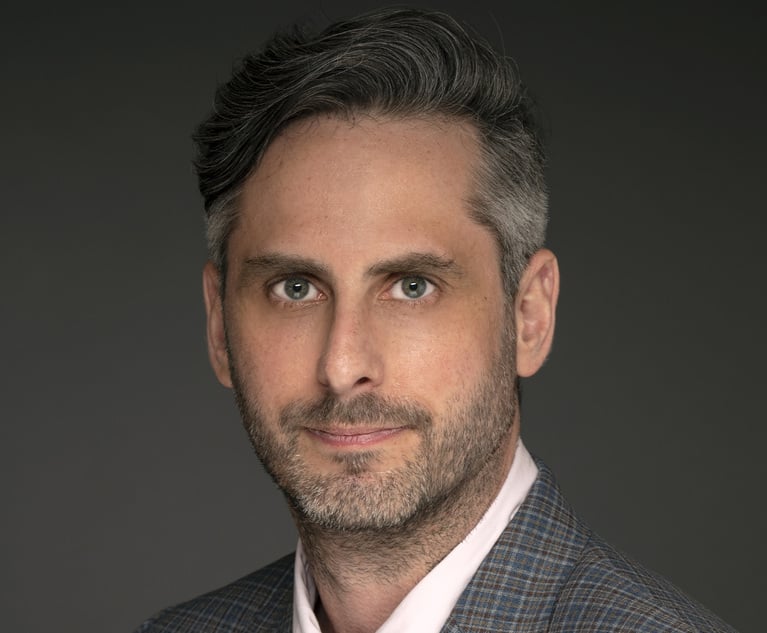Partner Suing Ogletree for Gender Bias Tells Her Story
Dawn Knepper, a former nonequity shareholder at Ogletree Deakins, opened up about her gender bias lawsuit against her prior firm.
October 04, 2018 at 05:48 PM
5 minute read
The original version of this story was published on The American Lawyer
 Dawn Knepper/courtesy photo
Dawn Knepper/courtesy photo
Former Ogletree, Deakins, Nash, Smoak & Stewart shareholder Dawn Knepper has accused her old firm of gender discrimination in one of a series of recent lawsuits targeting large firms with claims that they give women short shrift in pay, promotions, and leadership opportunities.
On Thursday Knepper, now a shareholder at Buchalter in Orange County, California, spoke to The American Lawyer about the circumstances that led to the litigation she's pursuing alongside other former colleagues at Ogletree. She also described what it's like, as an employment lawyer herself, to be involved in litigation as a client and what she hopes the case will achieve.
The following interview has been edited and condensed for clarity.
Before filing the lawsuit in January 2018, what was the situation like for you at Ogletree? Did you raise concerns internally?
I was with the firm for a long time, almost 13 years. I would say I poured everything I had into my efforts there. I originally started working for the firm in San Antonio, Texas, and decided at the conclusion of 2011 to move to California. As it relates to my case, that was a critical juncture. I was given no salary adjustment when I moved, despite the fact that there was a jump in my hourly rate. At Ogletree, they base their pay through a three-year look-back. Though they eventually gave me a very small adjustment, it hampered me for a long time because of the three-year look-back.
In January 2017, there were a number of women, including myself, who were very unhappy about [proposed compensation] numbers published ahead of the [annual] shareholder meeting. There was a group of us who actually met at that shareholder meeting and raised issues of pay equity. I continued to raise issues of pay equity along with other colleagues, including Tracy Warren [another named plaintiff in the Ogletree litigation], who was very vocal.
What, ultimately, compelled you to file the lawsuit?
I felt that I had been mistreated by my local management as well as the firm as a whole. I reluctantly made the decision to retain counsel. I felt I had exhausted every outlet within the firm to try and raise my concerns. I had experienced discrimination, harassment, retaliation, and a hostile work environment, which was really difficult.
I got to the point, in January 2018, where pay equity was something that was at the forefront of people's minds, and I felt it was important to file and step up and speak to the over-representation of men in leadership at Ogletree Deakins and all law firms.
Did the #MeToo movement or prior lawsuits filed by women partners against other large firms play into your decision to pursue litigation and go public with these claims?
I would say definitely that is true. It was very distinct in my mind that there was, that week that we filed, a story in the news with Michelle Williams and Mark Wahlberg about pay equity on that movie, “All the Money in the World.” I think it is a pivotal time for women, if we want to make change, we need to make ourselves heard.
Has your role as an employment lawyer affected the way you view the case? What about going up against a firm that advises large employers?
It is difficult when you do this for a living and you know where it can go, and what it can look like. While you might advise clients, [in light of this litigation], I will forever have a unique perspective on the difficult nature of being involved in litigation in a way that I never thought I would be.
With the fact that it is an employment law firm, it is ironic that this is what we advised our clients against. I would think that we should be the shining example of how to do it right, but that was not my experience, and not the experience of many other women at the firm.
You've gone into this suit with your own specific claims, of course, but it also sounds like you've had your mind on the bigger picture. What do you hope this litigation will achieve?
My ultimate goal is to see that the overrepresentation of men in leadership and key positions at law firms, and positions of pay and power, are addressed. I would like to see more women get to positions where we are able to get the credit we deserve for the good work that we do. At Ogletree Deakins, and particularly in California, there are a lot of great women who were not getting appropriate credit for the work that they were doing, and I'm sure that this is universal throughout law firms.
Since the suit was filed, you've since switched firms. Beyond that, has the case affected your career?
I think that is yet to be determined. I will say that I have had a number of people outside Ogletree Deakins and even at competitor law firms reach out to me with words of support. That has been very impactful for me. I felt good that I am taking a stand and I am doing the right thing.
But in terms of the long-term impact on my career, I don't know yet. I think it's very fresh and raw, honestly.
This content has been archived. It is available through our partners, LexisNexis® and Bloomberg Law.
To view this content, please continue to their sites.
Not a Lexis Subscriber?
Subscribe Now
Not a Bloomberg Law Subscriber?
Subscribe Now
NOT FOR REPRINT
© 2025 ALM Global, LLC, All Rights Reserved. Request academic re-use from www.copyright.com. All other uses, submit a request to [email protected]. For more information visit Asset & Logo Licensing.
You Might Like
View All
How I Made Office Managing Partner: 'Stay Focused on Building Strong Relationships,' Says Joseph Yaffe of Skadden

US Patent Innovators Can Look to International Trade Commission Enforcement for Protection, IP Lawyers Say

How the Deal Got Done: Sidley Austin and NWSL Angel City Football Club/Iger

How Uncertainty in College Athletics Compensation Could Drive Lawsuits in 2025
Trending Stories
Who Got The Work
J. Brugh Lower of Gibbons has entered an appearance for industrial equipment supplier Devco Corporation in a pending trademark infringement lawsuit. The suit, accusing the defendant of selling knock-off Graco products, was filed Dec. 18 in New Jersey District Court by Rivkin Radler on behalf of Graco Inc. and Graco Minnesota. The case, assigned to U.S. District Judge Zahid N. Quraishi, is 3:24-cv-11294, Graco Inc. et al v. Devco Corporation.
Who Got The Work
Rebecca Maller-Stein and Kent A. Yalowitz of Arnold & Porter Kaye Scholer have entered their appearances for Hanaco Venture Capital and its executives, Lior Prosor and David Frankel, in a pending securities lawsuit. The action, filed on Dec. 24 in New York Southern District Court by Zell, Aron & Co. on behalf of Goldeneye Advisors, accuses the defendants of negligently and fraudulently managing the plaintiff's $1 million investment. The case, assigned to U.S. District Judge Vernon S. Broderick, is 1:24-cv-09918, Goldeneye Advisors, LLC v. Hanaco Venture Capital, Ltd. et al.
Who Got The Work
Attorneys from A&O Shearman has stepped in as defense counsel for Toronto-Dominion Bank and other defendants in a pending securities class action. The suit, filed Dec. 11 in New York Southern District Court by Bleichmar Fonti & Auld, accuses the defendants of concealing the bank's 'pervasive' deficiencies in regards to its compliance with the Bank Secrecy Act and the quality of its anti-money laundering controls. The case, assigned to U.S. District Judge Arun Subramanian, is 1:24-cv-09445, Gonzalez v. The Toronto-Dominion Bank et al.
Who Got The Work
Crown Castle International, a Pennsylvania company providing shared communications infrastructure, has turned to Luke D. Wolf of Gordon Rees Scully Mansukhani to fend off a pending breach-of-contract lawsuit. The court action, filed Nov. 25 in Michigan Eastern District Court by Hooper Hathaway PC on behalf of The Town Residences LLC, accuses Crown Castle of failing to transfer approximately $30,000 in utility payments from T-Mobile in breach of a roof-top lease and assignment agreement. The case, assigned to U.S. District Judge Susan K. Declercq, is 2:24-cv-13131, The Town Residences LLC v. T-Mobile US, Inc. et al.
Who Got The Work
Wilfred P. Coronato and Daniel M. Schwartz of McCarter & English have stepped in as defense counsel to Electrolux Home Products Inc. in a pending product liability lawsuit. The court action, filed Nov. 26 in New York Eastern District Court by Poulos Lopiccolo PC and Nagel Rice LLP on behalf of David Stern, alleges that the defendant's refrigerators’ drawers and shelving repeatedly break and fall apart within months after purchase. The case, assigned to U.S. District Judge Joan M. Azrack, is 2:24-cv-08204, Stern v. Electrolux Home Products, Inc.
Featured Firms
Law Offices of Gary Martin Hays & Associates, P.C.
(470) 294-1674
Law Offices of Mark E. Salomone
(857) 444-6468
Smith & Hassler
(713) 739-1250






